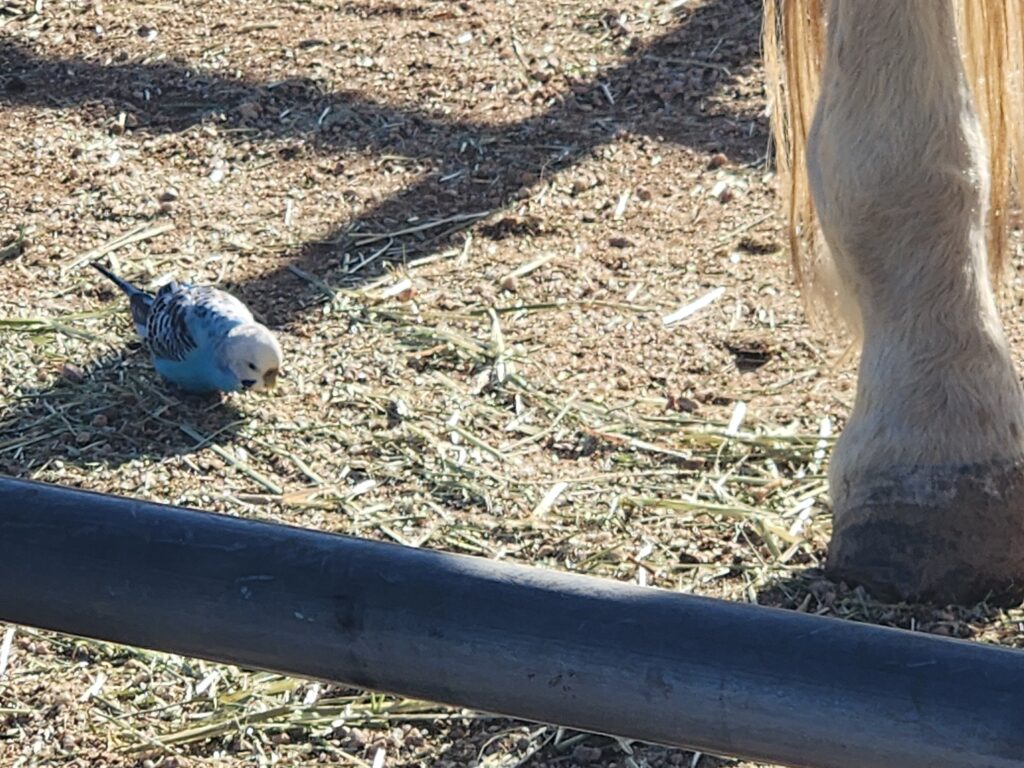
A bright blue flick of movement, almost too small to see. White feathers spark the light, even more startling than the blue. What was that?
I am not a birdwatcher in the true sense. I don’t know names or habits. I don’t keep lists or have binoculars. Sure, barn swallows have been dive-bombing me most of my life. I felt thrilled when I saw a Great Horned Owl in the barn tree. Every year, I hope the Canada geese will rise young on my pond beside the mallards. But the last few years have been quiet. Fewer birds, less nesting. We’ve missed the Mountain Bluebird migration and the Pelicans haven’t stopped here in years.
You don’t need to be a scientist to notice the drop in numbers. Research says we’ve lost over three billion adult birds since 1970. “Common birds—the species that many people see every day—have suffered the greatest losses according to the study. More than 90% of the losses (more than 2.5 billion birds) come from just 12 families including the sparrows, blackbirds, warblers, and finches.” But here on my prairie, it feels like way more, especially in the last ten years. With all the changes from global warming, this feels like sad proof. Have you noticed?
Most of my bird watching happens in scratch breaks during mucking, while feeding the horses, or when Edgar Rice Burro and I watch the sunset. The line between wild and domestic animals fascinates me. We draw property boundaries on maps, but animals don’t care. They travel without passports and intermingle with livestock. Birds especially. You can’t fence them in or out. It’s one of their best qualities.
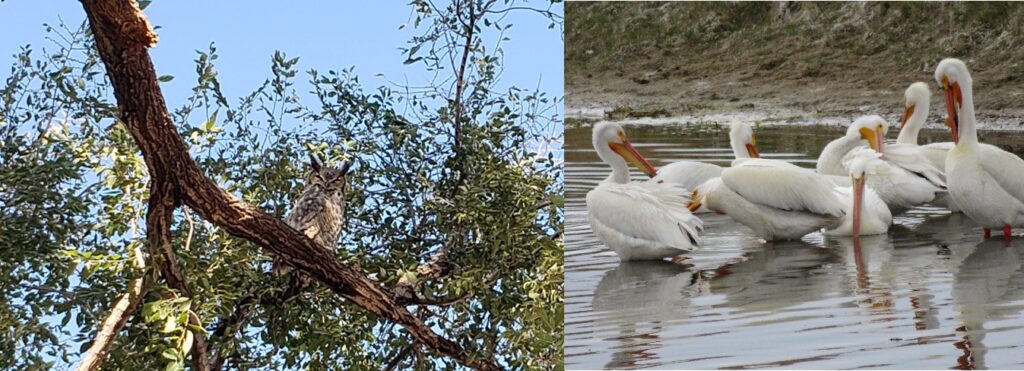
It’s fledgling season. Only one starling nest in the barn this year, but I watch it. Four hatchlings with fat yellow lips and nearly enough feathers to fly.
There were two Canada geese families on the pond, four adults and five goslings. I was ecstatic to have them. Then a week later, one of the adults was missing and all the goslings were gone but one little singleton. It could be coyote pups learning to hunt, we hear them yodeling in the night. But I fear it was the pair of Rottweilers next door. If it moves, they chase it down. City dogs who think all wildlife are intruders. Some loss is nature but some is us.
That was when it happened. A soft wing sound very close. Was a budgie parakeet on the fence panel a few feet away? I froze. Then a pair of sparrows spirited him off, so quickly I wasn’t sure I believed what I saw.
My grandmother (born in the late 1800s) always had a budgie. She lived in North Dakota, up by the Canadian border where winters are bleak. A budgie was a delicate, fancy thing for a house without indoor plumbing. I only saw my grandmother a handful of times, but how she must have worked to keep that bird alive. He flew out of his cage and around her kitchen when she cooked, and I thought it was simply the most exotic thing in 1950s North Dakota.
I saw the flash of color again, too clean, blue and white. On the ground now, his round beak picking at hay scraps in a horse pen. Parakeets are house birds. He’s not hardy enough for the outdoors. He hopped up to a fence panel, and I asked quietly, not too close, if he’d come to my offered finger. Chasing him would never work, but he might be hand-trained. He flitted off.
I wondered if I should trap him. There was lots to eat and I’d seen him in the birdbath. I called a friend who knows about birds, and she suggested a cage with a mirror; he might flock to others of his kind. He was flashing between leaves, flying to the haystack with the sparrows, then back to the tree. Maybe I’m nuts, but it looked like he was friends with everybody. I was undecided.
I never saw a wild thing sorry for itself. -D.H. Lawrence
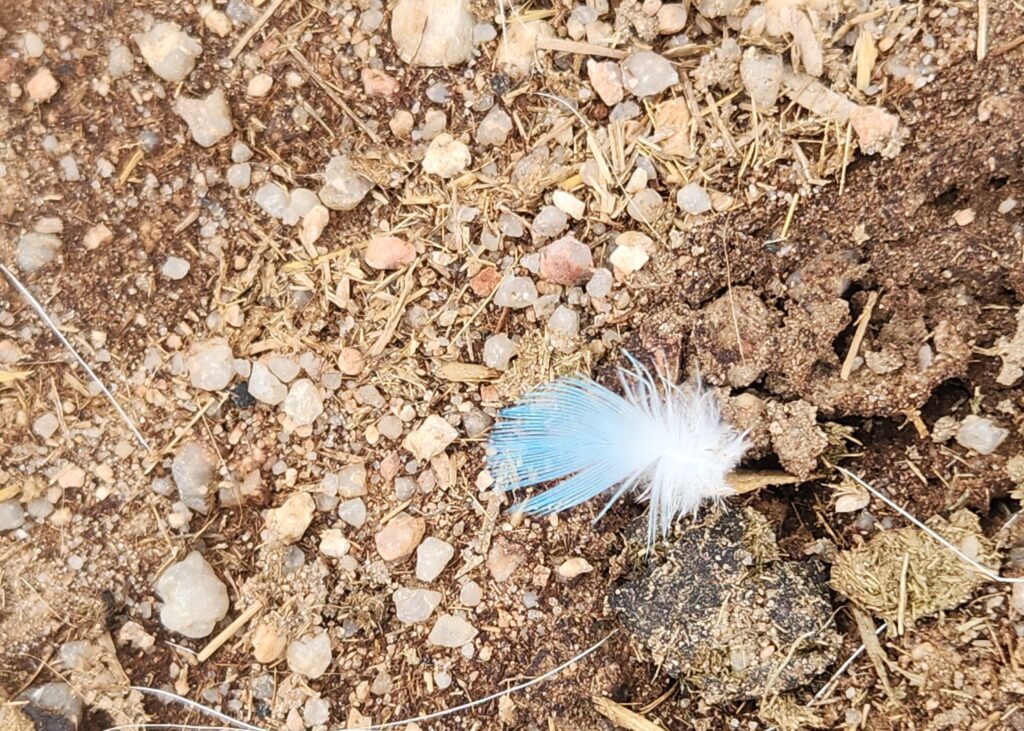 I followed him through pens, quietly wondering if I should toss a hay net over him, but worried that I’d kill him trying to save him. Then he’d flutter away, sparkling bright next to the brown sparrows, leaving me half worried and half filled with glee. He ate from our birdfeeder, next to blackbirds and doves. His beak is just so wrong, but he even got along with a marauding striped gopher.
I followed him through pens, quietly wondering if I should toss a hay net over him, but worried that I’d kill him trying to save him. Then he’d flutter away, sparkling bright next to the brown sparrows, leaving me half worried and half filled with glee. He ate from our birdfeeder, next to blackbirds and doves. His beak is just so wrong, but he even got along with a marauding striped gopher.
A few days later, my farrier was between trims when he blurted out, “What was that?” Peering into the next pen, “Oh my,” he said, not believing his eyes. We often talk about the undomesticated nature of horses. How often does the cure become worse than the original condition for our pets? Humans think we are gods who can control outcomes. But what if the budgie wasn’t a problem to be solved?
I knew budgies weren’t native to Colorado, and winter would kill him. Who’s to say that he wouldn’t leave with the blackbirds? Who’s to say he didn’t come with them? Does he value his freedom, or is it that I value mine so much?
The summer after second grade, I spent two weeks with my grandmother and her budgie while my mother got cancer treatment. Sometimes I rode bikes with a cousin, but I remember days were long. My grandmother scolded me often, always telling me I would be the death of my mother. I was in grade school; I took it literally. Of course, I had no idea that was happening at home. Our family kept secrets.
But that was when my grandmother decided about me. It might have been a misplaced emotion at first, but she continued thinking I was wild, meaning bad, and I was certain to ruin my young life. I probably did talk back, knowing me. Her biggest fear, and my unfulfilled destiny, was that I would have a teen pregnancy, like so many local girls. But weren’t we all just looking for someone who liked us?
By the time I was thirty, she was critical that I didn’t have children. I swear, horses are not nearly so fickle. Why are humans such disaster thinkers, always braced for the worst outcome? Would it be so hard to say a kind word? And what makes us think wild things need to be locked up and saved?
It’s been two weeks now and I see the budgie most days. Today he was in the far pen next to the pond. If he was brown, I’d miss him at this distance, but there he was—a target for predators—a fearless small bird who is living large. I’ve been putting some extra kibble in the feral cat’s bowl in the barn, hoping he was either too old or that his taste ran to varmints. The tabby leaves dead mice around the barn in payment for the kibble. But that’s the circle of life, too, as true as goslings and Rottweilers. As inevitable as gravity.
I’ve given up on the cage idea. Maybe I’m selfish but I get such joy to see this little bird in the big world, not afraid to show his colors. One way or another, he will fly away. As birds do. For now, I choose to see him as a tiny blue miracle, a harbinger of beautiful and rare things ahead.
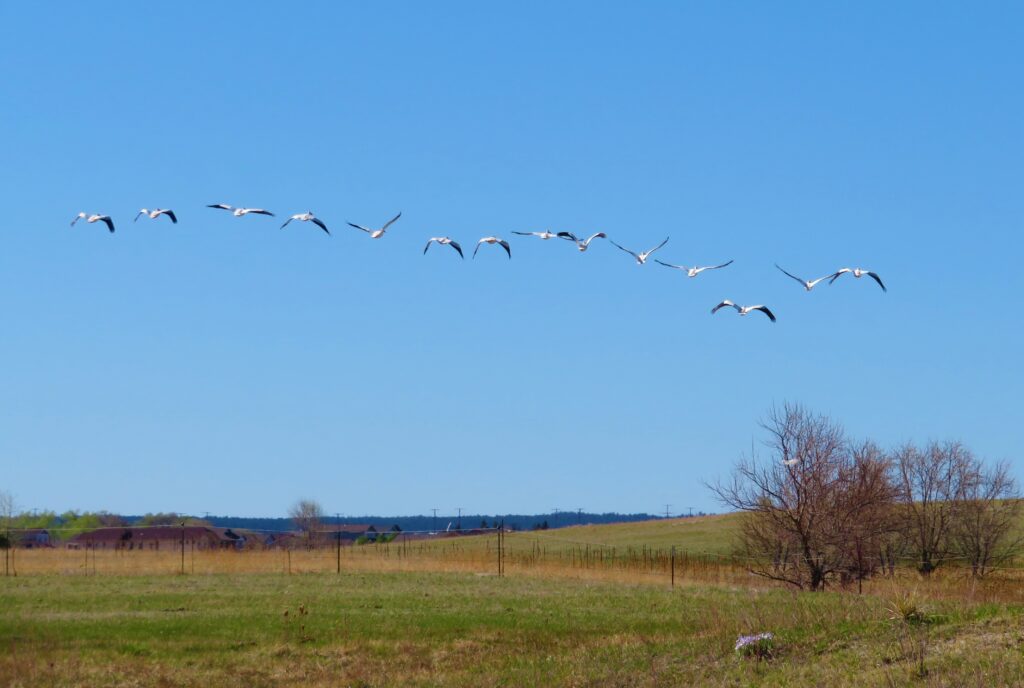
…
Relaxed and Forward Training by Anna Blake is no longer on Facebook because of repeated hacking. If you or your horse appreciate my writing, please share, subscribe to this blog, or join us at The Barn School.
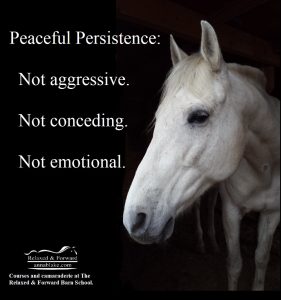 The Barn School, is a social and educational site, along with member sharing and our infamous Happy Hour. Anna teaches courses like Calming Signals and Affirmative Training. Everyone’s welcome.
The Barn School, is a social and educational site, along with member sharing and our infamous Happy Hour. Anna teaches courses like Calming Signals and Affirmative Training. Everyone’s welcome.
Want more? Become a sustaining member, a “Barnie.” Subscribe to our online training group with affirmative demonstration videos, audio blogs, daily quotes, free participation in “group lessons”, and live chats with Anna. Become part of the most supportive group of like-minded horsepeople anywhere.
Visit annablake.com to find archived blogs, purchase signed books, schedule a live consultation, subscribe for email delivery of this blog, or ask a question about the art and science of working with horses.
Ride for a new brand, find our Relaxed and Forward swag at Zazzle.
Love your blog. Please leave a cage with a mirror and lots of budgie feed in it near where the little Australian bird is flying. There is no snow where buu0dgies live and he was probably born and raised in an indoor cage.
You can train budgies to fly free and come back to their cages at suppertime so they can sleep indoors. You are a horse trainer. The principle is the same. You don’t leave horses outside 24/7 in the winter unless they are a breed that is resistant to cold like Iceland or Shetland ponies. But the budgie won’t grow a thick coat in winter and he cant fly back home to Australia where the climate is right. Or phone a welfare organization to catch and rehome him. He is a pet bird, not a feral bird. Freedom is fine, but would you like to sleep outside at night? I’m a veterinarian in my spare time, as I think you may remember.
Thanks for your thoughtful comment, Cheryl. I’m sure he escaped a home. I’ve had many caged birds when I was younger: lovebirds, doves, finches, and I hand trained a couple of wild parrots. That was before parrots flew to my hand in the wild. And I probably do deserve some blowback on this post, animal advocate that I claim to be. I wouldn’t want to sleep outside in the winter, but I wouldn’t want a cage either. With all the youngsters falling out of nests, rescues are busy this time of year. It’s true I keep my dogs in the yard and my horses in pens but somehow birds are different. I am frantic about the state of chickens in factory farms. I know I’m not fair and that I disappoint when I say this but I just can’t. This little freedom is my small trade for all the lives I’ve trapped in cages.
I have to agree, Anna – wild & free beats life in a cage for a wild creature, any wild creature! Sounds like this little bird has come into his/her own and become part of a flock.
Thanks, Maggie
Budgies far from their wild habitat need rehoming or they wouldn’t survive the cold… the bird sanctuary I took my little rescue budgie to confirmed… he just flew in one warm summer day to the barn where I was hanging out with my horse, perched on my shoulder and began yelling into my left ear… I got the gist…was lost and needed rescuing from kites, dogs and barn cats.
And yes, 80% of the birdlife around my horse’s current barn (very agricultural) has disappeared over the last 30 years caused (among other things) by the excessive use of sprayed pesticides and neonicotinoids. They kill off the insects (pollinators) the sedentary birds feed on. No food= no reproduction. Caused by humans.. as are those Rottweilers… the pond could do with Jurassic park juicing.
Thanks for your comment, I understand your point. Yours was much more tamed than this one, who stays farther away each time I see him. I’m trusting that. Sorry if I disappoint.
Can’t agree more… my rescue was a homebody whereas your fella found his flock and the call of the wild… whether he survives the cold winds of winter or migrates with the blackbirds, he’d have lived his life to the full…
The goslings and the Rottweilers, however, saddens me.
It’s sad for the Rotties. One is very fearful and that can turn to aggression. When I met the owner, he said they’d worked with a trainer and had good results but don’t do it that way any more. The dogs are unraveling and their humans aren’t reading it well.
We see peach faced (and other colors) love birds. Escapees or deliberately loosed. They now have breeding colonies in parts of Phoenix and it’s suburbs. I see them in my friends yard at her feeders mostly but have spotted some in my rural area. They are so bright and noisy. It was originally thought these little mostly fruit eaters wouldn’t survive but no one told the birds. And they are originally an African species. Amid the roadrunners, quail, thrashers and finches they are amazing flashes of color.
Those lovebirds are tough as terriers. Thanks, Mary
Anna, with a lifetime of animal welfare work behind me, I am with you on this one. If we could talk to him, I am sure he would say he prefers a few months of freedom, to years in a too-small cage in someone’s dining room. Colonies of small parrots all over the county are thriving, descended from escaped pets. This would be expected in areas like Florida or California, but one of the largest is in Chicago Illinois. I doubt your little guy will live a long life on the flat windy Colorado prairie, but he may be made of the same sturdy stuff as those Chicago birds. Either way, he is living his life on his terms despite man’s intervention, and isn’t that exactly what we undomesticated women are trying to do ourselves?
https://chicagomaroon.com/28830/grey-city/quiet-protest-chicagos-monk-parakeets/
Exactly. I didn’t always think this way, but sure do now. Thanks for you years of work, I appreciate you.
One of your horses reincarnated into a different kind of flight animal. Having just lost my horse, that would have been my first crazy thought. Sunny’s back! I hope the little guy makes it…
Not a bad idea, thanks Cheryl.
I’m with you, Anna. Let him enjoy his carefree cage-free life for as long as it may last.
Thanks, Emily
I have a pair of budgies (blue and bright yellow) that showed up outside my central Texas window. I did find their prior owner on Nextdoor but she seemed less than interested in getting them back. I do have a cage outside for them but so far they have said “nope” and have so far not set foot inside the cage despite the food in there. So I keep the bird feeders full and hope they have they have the smarts to survive in the current TX heat. Maybe they will survive to the winter. I sure hope so. I call them Blueberry and Bananas. Good luck to your little blue guy.
And good luck, Gina thanks for your comment.
I do understand your thinking, but I would give him the choice. Put out a cage and let him decide if he wanted to be in it or not. His choice, not yours.
I think he’s made a choice. Not mine. Thanks, Aquila
Anna, thanks for highlighting the plight of our birds. Like canaries in the coal mines, the recent nation-wide declines in abundance of many of our most popular grassland songbirds, like Barn Swallows, Meadowlarks, and Red-winged Blackbirds, are a warning that all is not right in OUR world, and that is a signal ignored at our own peril.
Thanks, John. You are my hero. I think of you and Nancy so often. Hope you are well. Love to the Flying Auk
What a delicious post to read upon returning to civilization from our own time of freedom with our horses in wild places. Especially after these past few weeks, I wouldn’t even consider trying to capture that budgie. Between the freedom to spread your wings or the confines of domestication, safety is overrated. Driving through Portland pulling a horse trailer during rush hour yesterday made me yearn for the trail again. Thanks for the lovely words to soothe a homesick heart.
So glad to know your riding trip when well. We measure the success of a trip in equal proportion to how much the traffic bothers us on the way home. I know you and Bill will be glad to be home with the dogs, back to balancing wild and domestic… Thanks, Kaylene
Anna,
You might wish to put some ‘parakeet feed’ out for him, and some fruity feed too (such as Cockatiel feed).
They like broccoli and some fruit, if you feel inclined, but likely he may get some berries around and about.
Most likely he has escaped or been released from a prior home. He’ll be around the barn, especially in fall.
I don’t know if he will stay in winter or make it, but he’s having a great life now. As you have barn cats, I’d
keep the feed up really high. My cats can jump to quite some heights so it should be taller than you are,
at least. Perhaps put a water dish out for him, too.
He’s a messenger and also a miracle, so enjoy him!
Love, Nuala
thanks, Nuala
Mon dieu! Ain’t it excruciating living on the razor’s edge of dilemma? I love how you gave this one space. Full face on. Thank you
I confess, these questions are wandering about in my own life as well. Mon Dieu, indeedy. Thanks, Cindy.
Lovely. We recently got chicks to raise, and I am noticing the wild birds more-catbirds, hawks, owls, bluejays, crows, Canada geese, cardinals, finches, starlings…all so beautiful. All so unique.
And just like that, a birdwatcher!! Thanks, Dawn.
Dear Anna, you are such a powerful writer and your descriptions are so empathetic. In our efforts to `save and rescue`we frequently just think about safety and comfort, whereas animals love to live on the edge and to have action and excitement. I have divorced myself from North American society and my blood relatives because of the pathologically psychopathic behaviour pattern of cruelty and contempt for all forms of life other than their own. I am determined to be Mexican and live with live cockroaches in the bathroom that are 2 inches long. Mexicans live with all kinds of insects and they are used to eating them as an excellent source of protein. This bird will probably migrate with other birds and seek warmer climates. Budgies are very smart. I hope to meet him here in Mexico. love you, Shirley
Thanks, Shirley. Too many of us forget we are animals living on the edge.
In case you wondered what has taken me so long to respond to this blog, Anna, I had a glitch trying to open “Undomesticated Budgie” from my email. I finally resorted to searching for your blog on the Internet. Weird, right?
Anyway, this latest was so thought-provoking. I do come down on the side of letting the little guy keep his freedom for however long nature will allow. Of course, as I’m typing this, my 9-year-old-born-in-a-barn-used-to-be-feral kitty, is comfortably napping on the pillow in front of me, I’m pretty sure not dreaming of what life would’ve been like had he been allowed to live it wild and free. That said, I have moments of guilt on my end for keeping him indoors fearing as a kitten he would not have survived the coming winter.
It’s complicated, isn’t it? I have had a string of feral cats who now sleep on my furniture. They look out windows but I’ve lost quite a few cats to coyote kills… My horses let me know they want out the front gate to graze by the road, again, I’m a party pooper. But cages are small and birds have wings. I don’t claim to be fair… Great comment, Lynell.
Yay to keeping the little guy free! And he may actually come to you this Fall if he’s still around and feels the need for additional tending. But I must say I find it ironic that so many of us can’t stand the thought of the bird in a cage yet put horses in a 12×12 stall for hours on end without a thought or care about it. It saddens me tremendously. I only hope that someday horse caregivers will realize this is not a good idea for so many reasons. I preach ample turn-out with others as often as I can (even if occasionally offending). I just don’t care. The site of horses in stalls for the majority of a 24-hour cycle is more offensive. I can only believe that the people who do that either don’t understand the animal, or just don’t care. Both equally horrible. Sorry to be a buzz kill!
And the owners can’t understand why their horses have so many problems — both physical and mental. My horse is in a stall for about 7 hours per day because she has to wear a grazing muzzle when out and I think she enjoys a break from it, at least she does ask to come in, but I believe in her heart she’d prefer 24/7 turn out. Isn’t that the life they are meant to have? So many changes in my thinking as I get older, Anna. Now when I see their sad eyes and their pinned ears as they look through the bars I just want to turn them all out! AHH!
That precarious balance between natural life and health conditions…
No, a cage for a winged creature, a box for a horse… I agree. Stalls are not as prevalent as they were years ago. Now I know of boarding facilities that even have track systems. But change comes slowly. Ever so slowly. Thanks, Kathy, aka buzz kill. Teeheehee
I think your budgie friend sounds like he’s living his best life.
Just wanted to share that I’ve also noticed a dramatic drop in the songbirds in our area (Olympia WA). We border 5000 acres of forest, have seasonal wetlands, and a lake and river nearby so habitat galore. It used to be (15 years ago) the birds would wake me at 4am from spring through summer. I’ve noticed the last few years it’s become eerily quiet.
I just miss them so much… Thanks Shaste.